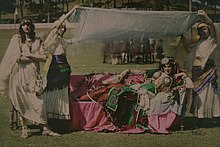Cleopatra
queen of the Ptolemaic Kingdom of Egypt from 51 to 30 BC
(Redirected from Cleopatra VII)
Cleopatra VII Philopator (Greek: Κλεοπάτρα Φιλοπάτωρ; 69 BC – 10 August 30 BC) was a political ruler and religious figure of ancient Egypt who, allied with Julius Caesar, solidified her rule. After Caesar's assassination, she aligned with Mark Antony of the Second Triumvirate with whom she produced twins, and whom she married by Egyptian rites. She committed suicide after the successful invasion of Egypt by the forces of Octavian, who afterwards, with the execution of her son Caesarion, ended the Ptolemaic dynasty.


- See also: Cleopatra (disambiguation)
Quotes
edit- He was dispos'd to mirth; but on the sudden
A Roman thought hath struck him.- As quoted, Antony and Cleopatra by William Shakespeare, Act I, (1623)
- Eternity was in our lips and eyes.
- As quoted, Antony and Cleopatra by William Shakespeare, Act I, scene ii (1623)
- Where’s my serpent of old Nile?
For so he calls me.- As quoted, speaking of Antony, Antony and Cleopatra by William Shakespeare, Act I, scene V (1623)
- My salad days,
When I was green in judgment, cold in blood,
To say as I said then!- As quoted, Antony and Cleopatra by William Shakespeare, Act I, scene V (1623)
- O, wither’d is the garland of the war!
The soldier’s pole is fall'n; young boys and girls
Are level now with men; the odds is gone,
And there is nothing left remarkable
Beneath the visiting moon.- As quoted, Antony and Cleopatra by William Shakespeare, Act III, (1623)
- Good sirs, take heart: —
We'll bury him; and then, what's brave, what's noble,
Let's do it after the high Roman fashion,
And make Death proud to take us. Come, away:
This case of that huge spirit now is cold. —
Ah, women, women! — come; we have no friend
But resolution, and the briefest end.- As quoted, Antony and Cleopatra by William Shakespeare, Act III, scene xv, (1623)
- I have Immortal longings in me.
- As quoted, Antony and Cleopatra by William Shakespeare, Act V, (1623)
- I am fire and air; my other elements I give to baser life.
- As quoted, Antony and Cleopatra by William Shakespeare, Act V, (1623)
- Peace, peace! Dost thou not see my baby at my breast,
That sucks the nurse asleep?- As quoted, Antony and Cleopatra by William Shakespeare, Act V, scene ii (1623)
Quotes about Cleopatra
edit- The secret is always to wear the same scent, until it becomes a personal, untransferable trademark, something that identifies us. Cleopatra knew this and, as with everything else she did, carried it to an extreme.
- Isabel Allende "Language of Flowers" anthologized in The Sweet Breathing of Plants: Women Writing on the Green World edited by Linda Hogan and Brenda Peterson (2001)
- Cleopatra's nose, had it been shorter, the whole face of the world would have been changed.
- Blaise Pascal, in Pensées (1658) No. 32
- Her beauty, as we are told, was in itself not altogether incomparable, nor such as to strike those who saw her; but converse with her had an irresistible charm, and her presence, combined with the persuasiveness of her discourse and the character which was somehow diffused about her behaviour towards others, had something stimulating about it. There was sweetness also in the tones of her voice; and her tongue, like an instrument of many strings, she could readily turn to whatever language she pleased...
- Plutarch, in Life of Antony
- It was a pleasure merely to hear the sound of her voice, with which, like an instrument of many strings, she could pass from one language to another; so that there were few of the barbarian nations that she answered by an interpreter.
- Age cannot wither her, nor custom stale
Her infinite variety...- William Shakespeare, in Antony and Cleopatra, Act II, sc. 2, Enobarbus
- All strange and terrible events are welcome,
But comforts we despise; our size of sorrow,
Proportion'd to our cause, must be as great.- William Shakespeare, in Antony and Cleopatra, Act IV, sc. 13, Cleopatra responding to Charmains request to "be comforted."
- Nought under heaven so strongly doth allure
The sense of man, and all his mind possess,
As Beauty's lovely bait, that doth procure
Great warriors oft their rigour to repress,
And mighty hands forget their manliness;
.....
And so did warlike Antony neglect
The world's whole rule for Cleopatra's sight;
Such wondrous power hath women's fair aspect
To captive men, and make them all the world reject.- Edmund Spenser, The Faerie Queene, Book V, Canto VIII, stanzas 1–2
Misattributed
edit- Kings are not elected. Gods are not elected.
- Cleopatra as portrayed by Elizabeth Taylor, in Cleopatra (1963)
External links
edit- Cleopatra by James Grout (part of the Encyclopædia Romana)
- Cleopatra on the Web
- Cleopatra VII Philopator
- Cleopatra VII (VI), Chapter XIII of E. R. Bevan's House of Ptolemy, 1923)
- ↑ Cleopatra VII on Ancient History Encyclopedia